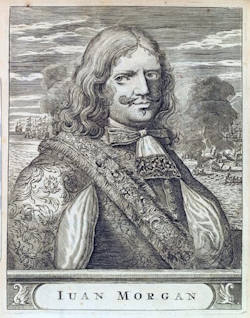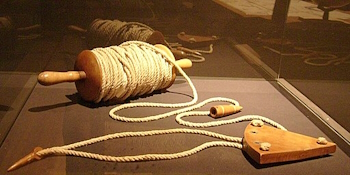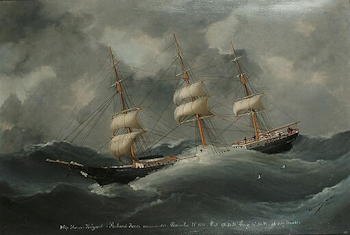 Although Henry Morgan is often called a pirate, he was really more of a privateer and soldier, only attacking the Spanish and usually not without a commission. At lot of information about Morgan comes from Alexander Exquemelin, who sailed with him as a surgeon. Most of this information was not very flattering, generally portraying the buccaneer leader in a negative light and accusing him of deeds that were not necessarily true. Among other things, Exquemelin claimed that Morgan was born poor and became an indentured servant in the Caribbean, but he in fact he more likely came from a family of wealthy Welsh farmers. One of his uncles, Edward Morgan, was even Lieutenant Governor of Jamaica. He was born Harri Morgan in about 1635 in either Llanrumney or Pencarn in the then Welsh county of Monmouthshire. His name was first anglicised to Henry when he was knighted in 1674. However, not much else is known about his early life.…
Although Henry Morgan is often called a pirate, he was really more of a privateer and soldier, only attacking the Spanish and usually not without a commission. At lot of information about Morgan comes from Alexander Exquemelin, who sailed with him as a surgeon. Most of this information was not very flattering, generally portraying the buccaneer leader in a negative light and accusing him of deeds that were not necessarily true. Among other things, Exquemelin claimed that Morgan was born poor and became an indentured servant in the Caribbean, but he in fact he more likely came from a family of wealthy Welsh farmers. One of his uncles, Edward Morgan, was even Lieutenant Governor of Jamaica. He was born Harri Morgan in about 1635 in either Llanrumney or Pencarn in the then Welsh county of Monmouthshire. His name was first anglicised to Henry when he was knighted in 1674. However, not much else is known about his early life.…
Sailing distances from Nassau
In the early eighteenth century travel by ship was the only way to reach many destinations. Progress was often slow, the distances covered were great, and time spent at sea unbearably long. The following table shows the distances those sailing to and from Nassau, New Providence sailed and the number of days usually required to cover that distance. Ships sailing from Europe to the Americas and back followed the trade winds. The North Atlantic trade winds blow from east to west at about 30 degrees latitude, which meant ships leaving Europe first sailed south and then veered west at the Canary Islands. On the return journey ships would use the Gulf Stream, which first went north along the coast of New Spain, turning north-east across the North Atlantic to Europe.
Measuring a ship’s speed
 In the Age of Sail, sailors measured the speed of their vessel by tying knots at intervals (every 47’3”) in a rope, called a log-line, which was attached to a wooden board called a chip log, also known as a common log, ship’s log, or just log. The board was dropped over the stern of the ship and the number of knots that passed in thirty seconds while the rope unwound were counted. The wooden board and line were attached to a reel and weighted on one edge to float perpendicularly to the water surface, offering substantial resistance to the water moving around it. The knots were tied on the line at a distance of 47 feet 3 inches (14.4018 m). They passed through a sailor’s fingers, while another sailor used a 30-second sand-glass to time the operation. The knot count would be reported and used for navigation. 1 knot equals 1 nautical mile or 1.151 land miles per hour.…
In the Age of Sail, sailors measured the speed of their vessel by tying knots at intervals (every 47’3”) in a rope, called a log-line, which was attached to a wooden board called a chip log, also known as a common log, ship’s log, or just log. The board was dropped over the stern of the ship and the number of knots that passed in thirty seconds while the rope unwound were counted. The wooden board and line were attached to a reel and weighted on one edge to float perpendicularly to the water surface, offering substantial resistance to the water moving around it. The knots were tied on the line at a distance of 47 feet 3 inches (14.4018 m). They passed through a sailor’s fingers, while another sailor used a 30-second sand-glass to time the operation. The knot count would be reported and used for navigation. 1 knot equals 1 nautical mile or 1.151 land miles per hour.…
Measuring wind speed
 In the past, the wind speed was usually reported in knots until the Beaufort scale was developed in 1806 by the Royal Navy officer Francis Beaufort. The Lighthouse builder, John Smeaton, proposed in 1759 that the wind speed should be correlated with simple verbal descriptions, but this never caught on. A knot is equal to 1 nautical mile per hour, which is approximately 1.15 land miles or 1.85 kilometres an hour.
In the past, the wind speed was usually reported in knots until the Beaufort scale was developed in 1806 by the Royal Navy officer Francis Beaufort. The Lighthouse builder, John Smeaton, proposed in 1759 that the wind speed should be correlated with simple verbal descriptions, but this never caught on. A knot is equal to 1 nautical mile per hour, which is approximately 1.15 land miles or 1.85 kilometres an hour.

